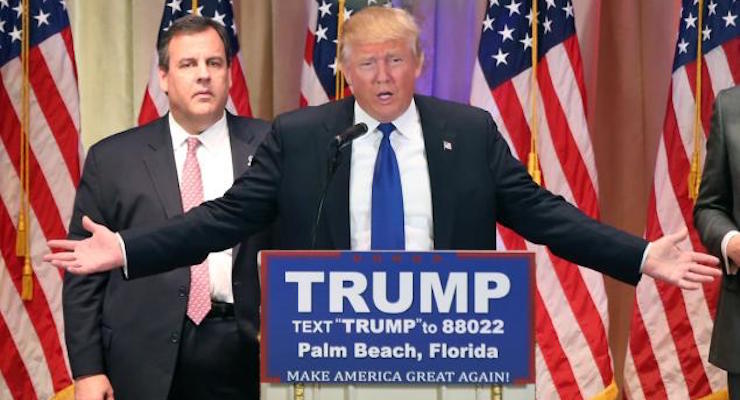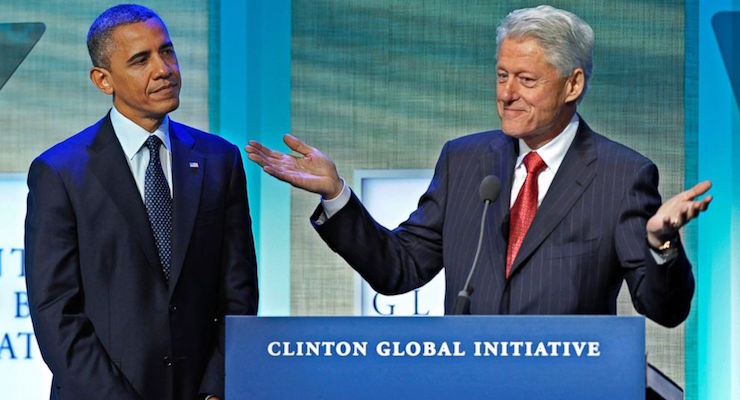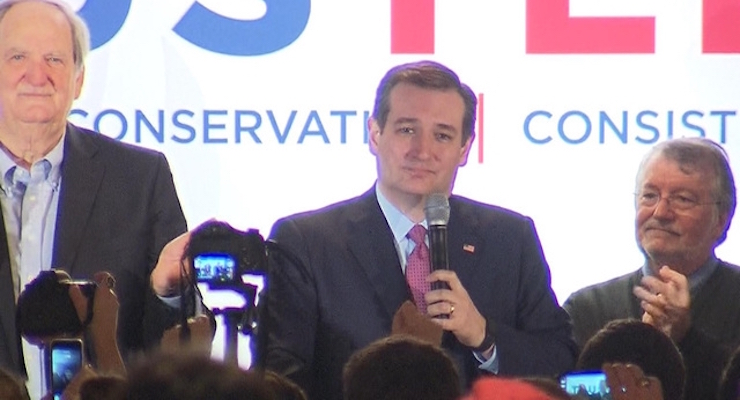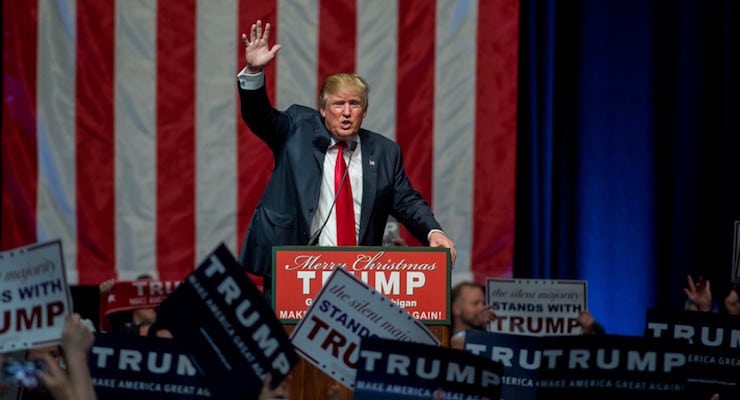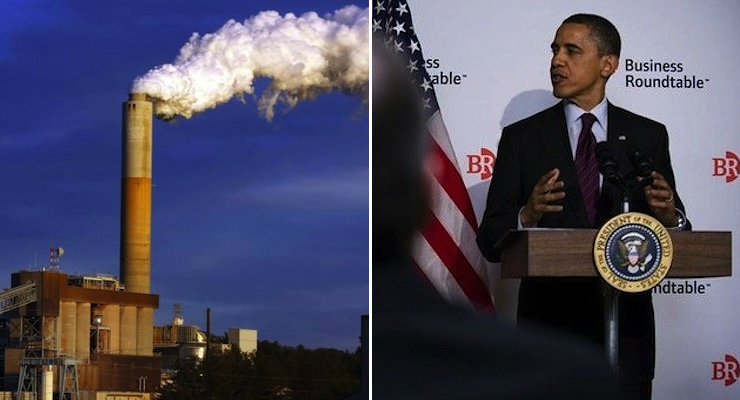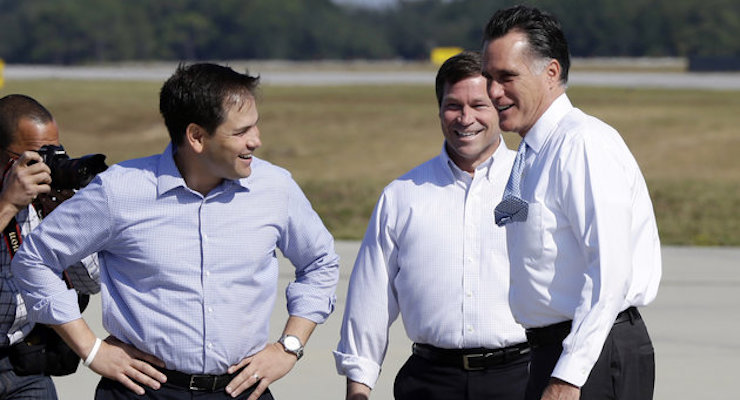
Former Massachusetts Gov. Mitt Romney is greeted by Rep. Connie Mack, R-Fla., and Sen. Marco Rubio, R-Fla., left, as he steps off his plane to attend campaign events in Pensacola, Fla., Saturday, Oct. 27, 2012. (AP Photo/Charles Dharapak)
It is disheartening that the Wall Street Journal editorial board, for whom I had such respect for years, is discouraging a narrowing of the GOP field if either John Kasich or Marco Rubio wins his home state Tuesday.
It’s bad enough for the editors to encourage Rubio to stay in if he wins Florida, but to invite Kasich to stay in is just madness.
Their underlying assumptions are wrong. They strongly imply that if Trump wins both Ohio and Florida on Tuesday, he’ll be the inevitable nominee. They are encouraging a mainstream media narrative that is guaranteed to form Wednesday morning if Trump wins both states (and some of the others).
In fact, truth be told, I’d wager that Ted Cruz’s team is hoping, grudgingly, that Trump does win those two states, because Cruz and company know, paradoxically, that this is their best chance to win the nomination outright, with the magic number of 1,237 delegates — or at least more delegates than Trump going into the convention.
The Cruz folks are not being fantastical. They have run the numbers. They know that in closed-primary states, which most of the remaining states are, Cruz has done far better. They know that as the field narrows, Cruz’s odds of winning states increase dramatically. Indeed, Cruz is already winning with greater margins in many closed states now than he’ll need to average in the remaining states. This is very doable.
The editors apparently don’t see the downside of a chaotic brokered convention. They clearly don’t respect the legitimacy of anti-establishment angst among GOP voters and are oblivious to the damage that would occur to the party and the conservative movement if establishment types were to hijack the convention for an establishment candidate.
Cruz understands this, which is why he is so determined to win the majority — or at least a plurality — of the delegates prior to the convention. If that occurs, no one, including Trump supporters, will be able to argue that the voice of the people would be suppressed if Cruz were to become the nominee.
The editors argue that if Trump fails to win both Ohio and Florida, “Republican voters should then welcome a longer primary fight all the way to the convention.” They say that if Rubio were to lose Florida and Kasich were to win Ohio, “Kasich would have renewed life after denying Mr. Trump Ohio’s 66 delegates. Mr. Kasich would be inclined to stay in the race, and he could help the Republican Party if he did.”
“Renewed life”? He never had life to begin with. And please don’t pussyfoot around and say the self-absorbed Kasich would merely “be inclined to stay in the race.” “Inclined”? He’d be salivating. For all we know, he’d be “inclined” to stay in the race even if he were to lose Ohio.
But how would Kasich’s staying in “help the Republican Party”? How could a brokered convention be in the party’s best interests? How could the persistence of a pro-amnesty spoiler candidate be good for the Republican Party? Why on earth should Republican voters welcome the nightmare of “a longer primary fight all the way to the convention”? It would magnify the chances of a divisive, destructive disaster.
Kasich, by the way, has recently doubled down on his pro-amnesty position. The editors’ objectivity is obscured because of their own relentless advocacy of amnesty. They embarrassingly tie themselves into a pretzel trying to argue that Kasich might have a better chance against Trump in the remaining primaries than Cruz, even considering his current delegate deficit. You want to talk about fantasies?
The editors’ argument that a three-man race would increase the chances of reducing Trump’s final delegate count reeks of tone-deafness. The delegate leader, with either an outright majority or a plurality, going into the convention will be the nominee, or there will be hell to pay.
But the editors’ line that most grates on me is, “But the winner-take-all states include the likes of California, where Mr. Trump might do better than Mr. Cruz, who has spent two years telling millions of Republicans that he doesn’t need their votes because they aren’t authentic conservatives.”
Excuse me? Are they not aware of Cruz’s strong performance in California polling? And was it not establishment darling Jeb Bush who implied he would win the primaries and the general without the base of the party?
Cruz has never said he doesn’t need or care about each and every Republican voter. His beef has never been with the people; it’s been with the GOP leadership and establishment, which have ignored the express wishes of the people and defied their own mandate to effectively resist President Obama’s oppressive policies and actions. Cruz doesn’t say he’s more authentically conservative than the grassroots. To the contrary, he wants to be their advocate and stand up to Beltway arrogance and corruption and the relentless march of leftism in this nation.
Despite the misinformation disseminated in some circles, Ted Cruz does not have an exclusivist message. Constitutional conservatism, by definition, is not extreme but mainstream. Properly and unapologetically articulated, it will resonate infectiously with people across society because it is an uplifting, positive message of equal opportunity, less government, robust liberty, maximizing prosperity, rebuilding our military, securing our borders and defeating our terrorist enemies. Who can argue with that?
